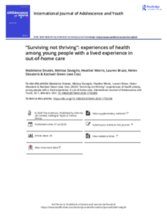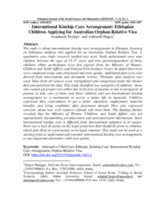Displaying 161 - 170 of 595
"Aboriginal groups say the NSW government’s child protection reforms don’t do enough to tackle the over-representation of Indigenous children and youths in state care, labelling the plans as unremarkable and leaving them feeling disrespected," says this article from the Sydney Morning Herald.
In this study the authors examined the relative contributions of maternal versus paternal criminal offending or mental health problems in relation to the time to the offspring’s first report to child protection services, or first placement in out of home care (OOHC), using administrative records for a population sample of 71,661 children.
This study aimed to explore the experiences and perceptions of health among young people (YP) who have previously lived in care.
Employing a systematic scoping methodology, this review examined the scope and breadth of literature focusing on children and young people living in residential care in Australia who have experienced sexual exploitation.
This article from ABC News explores the stories of some of "the more than 500,000 so-called Forgotten Australians who suffered abuse and neglect while living in out-of-home care over the past century" and how they have found healing through "a storytelling project that helps participants reimagine their past and invent new ways to see their stories."
The government of Queensland, Australia "has formally adopted every recommendation of the coroner after an inquest into the death of abused toddler Mason Jet Lee found his case was'a failure in nearly every possible way,'" according to this article from the Sydney Morning Herald.
This paper explores the efficacy of the United Nations Convention on the Rights of the Child (Convention, UN General Assembly, 1989) through the lens of the over-representation of First Nations children placed in out-of-home care in Canada and Aboriginal and Torres Strait Islander children in Australia.
"Three Aboriginal community-controlled organisations [in Australia] have been announced as the beneficiaries of a $3 million program that shifts responsibility for kinship carer support from the Child Protection Department to the non-government sector," says this article from InDaily.
This study is about international kinship care arrangements in Ethiopia, focusing on Ethiopian children who applied for an Australian Orphan Relative Visa.
This study explores how sub-Saharan African migrant parents and caregivers navigate parenting between the cultures that have shaped their lives and parenting expectations within the new environment.


